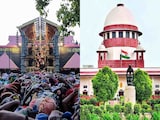Helicopters used for campaigning in Assam.
The setting sun in Guwahati sees dozens of helicopters in a large field below Tarun Gogoi's bungalow parked after a full day of campaigning. It shows how seriously the battle for Assam is being taken by all political parties.
For both the Congress and the BJP, it is a must-win. After defeats in Bihar and Delhi, the BJP needs this one. And the Congress just needs a victory, period. Especially since Kerala, their other state voting soon, may not hold.
But in Guwahati, you could mistakenly believe that the elections are over. There are few hoardings, fewer posters and almost no buntings. The normal cacophony of three wheelers with blaring loudspeakers exhorting people to vote are absent.
Assam is the only state in the current crop of five going to the polls that the BJP can hope to win. And both Prime Minister Narendra Modi and BJP President Amit Shah have spent considerable time and resources in trying to bring about that success.
Like in Bihar, the BJP did brilliantly in the 2014 general election in Assam, winning 7 of the 13 parliamentary seats and reducing the ruling Congress from 78 assembly segments won in the state polls of 2011 to just 24. They now have to repeat that and are publicly claiming that will get close to 80 seats. Privately, they are more circumspect and their target ranges from getting a majority of the 126 seats to emerging as the largest single party, a position that will allow the BJP to cobble together a coalition government.
And Sarma is a key man in the BJP now. While Sonowal comes across as a gentleman politician who projects an image of calm and confidence that people would look for in a Chief Minister, Sarma is a street fighter.
Sarma, like many other Assamese politicians, began his career in the AASU and also admitted to being part of ULFA. But after joining the Congress, he quickly rose in the ranks to Number Two in the government before defecting to the BJP last year, when he saw that his promotion was being blocked with Chief Minister Tarun Gogoi promoting his son. He claims he had no choice but to leave despite good relations with Sonia Gandhi as there was no place for him in the Congress.
Sarma is a brilliant organiser, a people's person as well as a wonderful orator. Campaigning aggressively, he is targeting Gogoi, saying he is too old and surviving on vitamins and needs to be rested into retirement. Sarma argues that Gogoi cannot understand the aspirations of the youth and is a spent force.
If the BJP comes to power, he will be a very powerful second-in-command, but how long will the BJP be able to contain his ambition? Although he could be given a ministry at the centre, he himself is clear that he wants to be in Guwahati.
So can three-time winner Gogoi stop the BJP from coming to power in Assam? Tarun Gogoi is the longest serving Chief Minister in Assam and is hoping to emulate the late Jyoti Basu by winning for the fourth time. Unfortunately, he has an uphill task. Anti-incumbency is a big factor. It is this that partly resulted in the surge for the BJP in 2014 when the Congress seemed to have become complacent. Since then, Gogoi has tried to win back support by increasing wages for tea labourers, adding three more autonomous councils to gain tribal support, and providing cheap rice for all. But that may not be enough to change the perception that he is too old, his party has been there too long and it's time for change.
The Congress readily admits that it has fallen behind in meeting the aspirations of the younger voters but also does not offer a clear vision of how it will amend that. And the incumbency and lack of governance shows. As you drive through that most fertile Brahmaputra Valley, the sharp contrast of the four-lane National Highway with local roads is shocking. Many untarred or potholed roads lead to villages. This contrasts sharply with Guwahati's high street which has the top national retail brands in glitzy buildings and an endless traffic jam. In rural Assam, motorcycles seem to have overtaken the cycle. And yet, therein may lie the problem. A level of aspiration has been reached, but is it a plateau or a pause? Gogoi seems too old to drive a new course and his son Gaurav too new to take on the task.
And it is this son or sons that Sarma makes fun of, calling the Congress the party of the children of leaders. This, he claims, is why they are out of touch with reality.
Besides being splintered and out of touch, the Congress is fighting this election alone. The Bodos have been enticed away to the BJP by Sarma and the Congress failed to put together an alliance with the powerful Muslim party the All India United Democratic Front (AIUDF), the RJD and the JDU alliance despite considerable pressure to do so. And while Gogoi, on the one hand, claims that fighting alone will keep the party strong, and stop it from being reduced to a side player as in West Bengal, he also publicly bemoans the lack of an alliance with the CPM-led Left Front. The fact is that an alliance, especially with the AIUDF, led by millionaire businessmen Maulana Badruddin Ajmal, would have created an unbeatable force in the 43 seats (out of 126) that have a very strong Muslim presence. The AIUDF did well in the 2011 state elections and in the general election, winning 13 and 15 assembly segments respectively.
While Muslims account for 34% of the population, and are spread across many parts of the state, it is in the second phase of voting on Monday that they will exert much of their influence, with 32 of the 61 seats being considered strong Muslim areas. And how the Muslims vote in the second phase will probably decide who will come to power.
The picture is confused. Travelling in one of those Muslim-dominated constituencies of Jagoroad, where both Sonia Gandhi and Congress defector Sarma were campaigning, the Muslims seemed to speak in different voices. Those at the Sonia rally seemed clear that the Muslims would vote tactically for the Congress a la Bihar to ensure that the BJP did not come to power, and would not support the AIUDF since it could not come to power on its own.
Muslim commentators agree that AIUDF seems to have lost some ground since 2014 and that voting in Lower Assam, where the second phase will take place, should help the Congress regain some Muslim support. In fact, Maulana Ajmal has been harping on the fact that he will be the king maker and this seems to be his rally call to keep his flock together, promising them that he can do what the Congress can- protect them by being in power. The BJP too has recognised the criticality of the Muslim vote and has put up seven Muslims candidates and is projecting itself in the words of aspiring Chief Minister Sonowal as a "secular party that will bring development to the state". But while there was a large contingent of Muslims at Sarma's rally that day who said they were voting for parivartan or change, similar statements in Bihar meant little as the Muslims voted tactically.
While the BJP is hoping for a new dawn, there are hurdles that remain to be crossed. They may already have tripped over a few in Upper Assam, which voted this last Monday, and where the BJP admits that they have lost ground since 2014 to the Congress amongst tea workers, and in those 52 seats where tea labourers are very influential, it could be a close run. In the last Assembly elections, the Congress swept 80% of these seats and that's why they won a majority.
A more even division of the 65 seats in Upper Assam is far more likely this time, leaving both parties depending on Lower Assam to provide the leap to power. A heavily split Muslim vote here will help the BJP to power whereas a strategic Muslim vote for the Congress ignoring development issues, incumbency and the AIUD could halt the BJP.
And, of course, there is the ultimate dream of the AIUDF alliance and some smaller parties - a hung assembly, where they will be able to barter their support.
(Ishwari Bajpai is Senior Advisor at NDTV)
Disclaimer: The opinions expressed within this article are the personal opinions of the author. The facts and opinions appearing in the article do not reflect the views of NDTV and NDTV does not assume any responsibility or liability for the same.
For both the Congress and the BJP, it is a must-win. After defeats in Bihar and Delhi, the BJP needs this one. And the Congress just needs a victory, period. Especially since Kerala, their other state voting soon, may not hold.
But in Guwahati, you could mistakenly believe that the elections are over. There are few hoardings, fewer posters and almost no buntings. The normal cacophony of three wheelers with blaring loudspeakers exhorting people to vote are absent.
Helicopters used for campaigning in Assam
Assam is the only state in the current crop of five going to the polls that the BJP can hope to win. And both Prime Minister Narendra Modi and BJP President Amit Shah have spent considerable time and resources in trying to bring about that success.
Like in Bihar, the BJP did brilliantly in the 2014 general election in Assam, winning 7 of the 13 parliamentary seats and reducing the ruling Congress from 78 assembly segments won in the state polls of 2011 to just 24. They now have to repeat that and are publicly claiming that will get close to 80 seats. Privately, they are more circumspect and their target ranges from getting a majority of the 126 seats to emerging as the largest single party, a position that will allow the BJP to cobble together a coalition government.
BJP's Himanta Biswa Sarma talking to NDTV's Prannoy Roy.
And Sarma is a key man in the BJP now. While Sonowal comes across as a gentleman politician who projects an image of calm and confidence that people would look for in a Chief Minister, Sarma is a street fighter.
Sarma, like many other Assamese politicians, began his career in the AASU and also admitted to being part of ULFA. But after joining the Congress, he quickly rose in the ranks to Number Two in the government before defecting to the BJP last year, when he saw that his promotion was being blocked with Chief Minister Tarun Gogoi promoting his son. He claims he had no choice but to leave despite good relations with Sonia Gandhi as there was no place for him in the Congress.
Sarma is a brilliant organiser, a people's person as well as a wonderful orator. Campaigning aggressively, he is targeting Gogoi, saying he is too old and surviving on vitamins and needs to be rested into retirement. Sarma argues that Gogoi cannot understand the aspirations of the youth and is a spent force.
If the BJP comes to power, he will be a very powerful second-in-command, but how long will the BJP be able to contain his ambition? Although he could be given a ministry at the centre, he himself is clear that he wants to be in Guwahati.
So can three-time winner Gogoi stop the BJP from coming to power in Assam? Tarun Gogoi is the longest serving Chief Minister in Assam and is hoping to emulate the late Jyoti Basu by winning for the fourth time. Unfortunately, he has an uphill task. Anti-incumbency is a big factor. It is this that partly resulted in the surge for the BJP in 2014 when the Congress seemed to have become complacent. Since then, Gogoi has tried to win back support by increasing wages for tea labourers, adding three more autonomous councils to gain tribal support, and providing cheap rice for all. But that may not be enough to change the perception that he is too old, his party has been there too long and it's time for change.
The Congress readily admits that it has fallen behind in meeting the aspirations of the younger voters but also does not offer a clear vision of how it will amend that. And the incumbency and lack of governance shows. As you drive through that most fertile Brahmaputra Valley, the sharp contrast of the four-lane National Highway with local roads is shocking. Many untarred or potholed roads lead to villages. This contrasts sharply with Guwahati's high street which has the top national retail brands in glitzy buildings and an endless traffic jam. In rural Assam, motorcycles seem to have overtaken the cycle. And yet, therein may lie the problem. A level of aspiration has been reached, but is it a plateau or a pause? Gogoi seems too old to drive a new course and his son Gaurav too new to take on the task.
And it is this son or sons that Sarma makes fun of, calling the Congress the party of the children of leaders. This, he claims, is why they are out of touch with reality.
Besides being splintered and out of touch, the Congress is fighting this election alone. The Bodos have been enticed away to the BJP by Sarma and the Congress failed to put together an alliance with the powerful Muslim party the All India United Democratic Front (AIUDF), the RJD and the JDU alliance despite considerable pressure to do so. And while Gogoi, on the one hand, claims that fighting alone will keep the party strong, and stop it from being reduced to a side player as in West Bengal, he also publicly bemoans the lack of an alliance with the CPM-led Left Front. The fact is that an alliance, especially with the AIUDF, led by millionaire businessmen Maulana Badruddin Ajmal, would have created an unbeatable force in the 43 seats (out of 126) that have a very strong Muslim presence. The AIUDF did well in the 2011 state elections and in the general election, winning 13 and 15 assembly segments respectively.
While Muslims account for 34% of the population, and are spread across many parts of the state, it is in the second phase of voting on Monday that they will exert much of their influence, with 32 of the 61 seats being considered strong Muslim areas. And how the Muslims vote in the second phase will probably decide who will come to power.
The picture is confused. Travelling in one of those Muslim-dominated constituencies of Jagoroad, where both Sonia Gandhi and Congress defector Sarma were campaigning, the Muslims seemed to speak in different voices. Those at the Sonia rally seemed clear that the Muslims would vote tactically for the Congress a la Bihar to ensure that the BJP did not come to power, and would not support the AIUDF since it could not come to power on its own.
Muslim commentators agree that AIUDF seems to have lost some ground since 2014 and that voting in Lower Assam, where the second phase will take place, should help the Congress regain some Muslim support. In fact, Maulana Ajmal has been harping on the fact that he will be the king maker and this seems to be his rally call to keep his flock together, promising them that he can do what the Congress can- protect them by being in power. The BJP too has recognised the criticality of the Muslim vote and has put up seven Muslims candidates and is projecting itself in the words of aspiring Chief Minister Sonowal as a "secular party that will bring development to the state". But while there was a large contingent of Muslims at Sarma's rally that day who said they were voting for parivartan or change, similar statements in Bihar meant little as the Muslims voted tactically.
While the BJP is hoping for a new dawn, there are hurdles that remain to be crossed. They may already have tripped over a few in Upper Assam, which voted this last Monday, and where the BJP admits that they have lost ground since 2014 to the Congress amongst tea workers, and in those 52 seats where tea labourers are very influential, it could be a close run. In the last Assembly elections, the Congress swept 80% of these seats and that's why they won a majority.
A more even division of the 65 seats in Upper Assam is far more likely this time, leaving both parties depending on Lower Assam to provide the leap to power. A heavily split Muslim vote here will help the BJP to power whereas a strategic Muslim vote for the Congress ignoring development issues, incumbency and the AIUD could halt the BJP.
And, of course, there is the ultimate dream of the AIUDF alliance and some smaller parties - a hung assembly, where they will be able to barter their support.
(Ishwari Bajpai is Senior Advisor at NDTV)
Disclaimer: The opinions expressed within this article are the personal opinions of the author. The facts and opinions appearing in the article do not reflect the views of NDTV and NDTV does not assume any responsibility or liability for the same.















